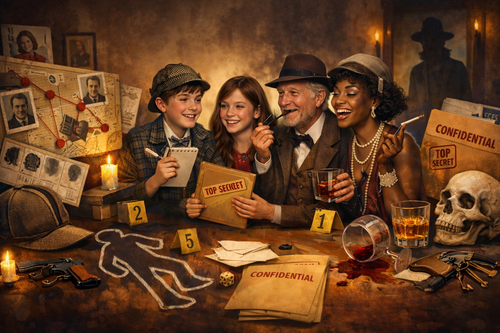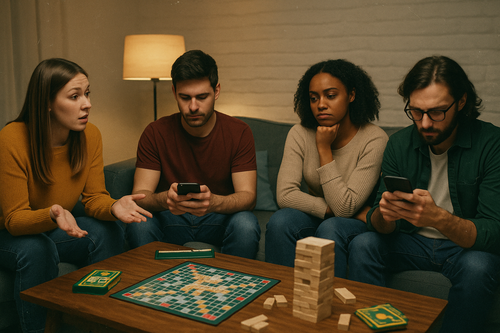
Who Dunnit? Depends on How You Like to Play It
Share
Murder mystery games come in all shapes and sizes, and if you've ever Googled "murder mystery party" or "case file game," you know exactly how confusing it can get. Are you supposed to dress up? Do you talk in an accent? Do you need to be good at puzzles? Or good at lying? Or both?
Let me break it down.
There are three main flavors: role-playing murder mysteries, case file games, and what I like to call hybrid mystery-puzzle experiences. Each of these taps into a different part of your brain—and your social circle. So let’s talk about what they are, how they work, and who actually enjoys playing them.
1. The Classic Role-Playing Murder Mystery
You know this one. Think dinner party, someone in a feather boa, someone else in a fake mustache. Everyone is assigned a character. You read a backstory, learn who you are (and maybe what secrets you’re hiding), and then for a couple hours, you act it out. Some games give you exact lines, others are more improv-y. There may or may not be a script, but there is definitely some finger-pointing and dramatic gasping.
Perfect for: Drama kids, theatre lovers, extroverts, or anyone who secretly wants to be on a reality show. If your group likes dressing up and throwing themselves into a role, this is your jam. Bonus points if you enjoy accents, overacting, or turning every interaction into a dramatic monologue.
Less great for: People who freeze when asked to pretend to be someone else. If your friends are more into solving things quietly than putting on a performance, this might feel like a forced talent show.
2. The Case File Detective Game
This is where you get a box full of evidence. It might include photos, timelines, witness statements, newspaper clippings, and maybe a few coffee-stained napkins. Your job? Figure out who the murderer is based on the information. There’s usually no acting, no characters to play—just you, your brain, and maybe a corkboard with some red string (if you’re feeling fancy).
Perfect for: Puzzle lovers, armchair detectives, or true crime junkies. If your friend group loves shows like Mindhunter or Dateline and you have a shared Google Doc for theories about unsolved mysteries, you’ll love this. It’s logical, analytical, and doesn’t require you to pretend you’re Lady Davenport of the Yorkshire Davenports.
Less great for: People who need a social hook. These games can feel isolating if you're not the kind of group that gets hyped over spreadsheets and timeline analysis. Also, no costumes. So, you know, that’s a downside for some.
3. The Hybrid: Murder Mystery Meets Escape Room (With a Dash of Roleplay)
Here’s where things get interesting. These games blend storytelling with puzzles and a bit of acting—just enough to keep things fun without making you feel like you need a theatre degree. You might have a character, sure, but you’re also solving riddles, decoding messages, and hunting for clues. The mystery unravels through gameplay, not just conversation.
This is where Min(d)gle Games lives. These kinds of games are designed to be social but still challenge your mind. You get the interaction, the fun of playing a role, and the satisfaction of cracking puzzles together. Think of it like a story that unfolds because you're solving things, not in spite of it.
(Psst - we currently only have one of these games available at the time of this post, but we are looking to develop more!)
Perfect for: Mixed groups. You’ve got the extrovert who wants to perform a little, the introvert who loves logic puzzles, and the friend who’s just here for the snacks. It balances social fun with mental challenge. Also ideal for team-building, friend groups who love game nights, or anyone who wants to do something a little different.
Less great for: People who want only puzzles or only performance. If your group has one mode and doesn’t like switching gears, the hybrid style might feel like too much going on at once. But if you're into variety and interaction, you're probably going to have a blast.
So...What Should You Play?
Here’s a quick cheat sheet based on who you’re playing with:
For the drama queens (and kings): Go with a full role-playing murder mystery. Get the costumes, get the wine, and get dramatic.
For the quiet thinkers: Case file games. Keep it calm, keep it focused. Consider adding a pot of tea and lo-fi music.
For the chaotic good energy group: Try a hybrid game. You’ll get moments to shine, laugh, think, and maybe even yell at each other over a locked box.
Of course, you can always mix it up. Start with a case file one week, try a role-playing game the next, then bring it all together with a hybrid.
That’s kind of what I love about Min(d)gle Games. They lean into that sweet spot where everyone gets to do something they’re good at, and no one has to carry the whole experience. It’s social, it’s smart, and it’s just weird enough to keep things memorable.
Whether you're a puzzle solver, a born performer, or just someone who likes watching your friends spiral into dramatic accusations, there's a mystery style for you. So next time you hear someone ask, "Who dunnit?" — the better question might be: how do you want to find out?



